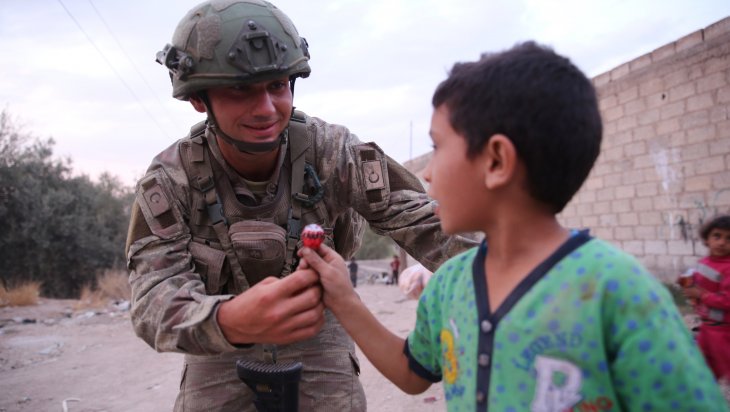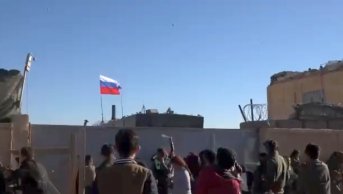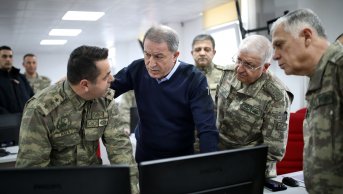Operation Peace Spring: Who won what?

The outcome of the Operation Peace Spring is likely to create critical impacts on the political solution in Syria, the future political structure of the country and the competition between Ankara, Moscow and Tehran even though the operation itself is related to Turkey’s security concerns.
For Ankara, the heart of the matter was not the US military presence, but the alliance between the US and YPG/PYD, the Syrian branch of PKK. Although Turkey had prioritized diplomacy, it has launched a unilateral military intervention for ending YPG’s control in Syria, dubbed ‘Operation Peace Spring’ on 9 October 2019, when it perceived that diplomacy is failing. The operation has brought about radical changes in behaviour of all actors involved.
US: Expecting too many returns for few investment
The United States used to view YPG as an effective local partner in the fight against ISIS. After ISIS’s territorial dominance was pushed back, the US has sought to redefine its relationship with YPG and its presence and priorities in Syria. It has set three goals for its continued presence in Syria; a political situation for the conflict (which means ensuring political status for YPG areas), removing the Iranian proxies out of Syria and preventing the resurgence of ISIS.
Nevertheless, the biggest paradox of the US in Syria was that it set too ambitious goals while refraining from major commitment while relying on local actors. More importantly, it has opted to ally with YPG, a non-state actor which is recognized as a terrorist organization by many actors, instead of a regional power.
As a matter of fact, the US-YPG alliance has reached its limits after the fight against ISIS was done. After that it was impossible for US to achieve its strategic objectives in Syria and the Middle East with YPG. Even though some elements within the US decision making circles, which are quiet but effective, stated these observations, some others, which had developed emotional ties with YPG, prevented or delayed a shift in the US commitments.
For observers, President Trump seemed to have the perspective that the US should not be at odds with a regional power such as Turkey for the safe of YPG, and that the alliance with Turkey is the best and the most realistic way to achieve the objectives of the US in the long run. The recent US rhetoric about YPG has adopted a balanced approach, most likely due to the impact of those who adopt a similar way of thinking. Once again, the US has sought to strike a balance between its long-term political expectations and credibility in foreign policy. Exactly at this point, the Operation Peace Spring has empowered those among the US decision makers who understand Turkey’s importance and view the alliance with the YPG unsustainable in the long run. As a matter of fact, Trump has since the beginning stated its opinions that his country should spend no more energy and time in Syria and the Middle East. When the risk of confrontation with Turkey got real, the US withdrawal from Syria hastened. With the Operation Peace Spring in motion, the US military forces withdrew from Manbij and the entire Turkey-Syria border.
Race to fill the power vacuum
The power vacuum that emerged after the US withdrawal from Syria has resulted in a competition between Turkey, Russia, Syria and Iran. As a matter of fact, these actors have found a common ground in Astana about the east of the river Euphrates and the US military presence. Russia, as well as Syria and Iran to some extent, have supported Turkey’s military pressure as an opportunity to ensure the US withdrawal. For them, Turkey unlike the US is an actor that they can limit and deal with. Therefore, Moscow, who initially encouraged Turkey behind the curtain, opted for limiting Turkey after the operation was launched.
With the mediation of Russia, Syria and YPG have reached a military consensus. Accordingly, YPG accepted Syrian regime forces into Manbij, Ayn al Arab and Hasakah, and promised to support for the unity and integrity of Syria under the flag and authority of the President. In return it has sought to ensure Russia’s and Syria’s protection against Turkey. In effect, it was forced into a decision between total eradication and compromising its authority, which means giving up its maximalist goals.
Russia: From a dominant to a pivotal role
Russia was already at the forefront as the most influential external actor in the Syrian crisis. Yet, the Operation Peace Spring has made it a pivotal actor in Syria.
Even though the US does not project power in Syria as much as Russia, it nevertheless proved to be a balance against Russia for its international political influence and deterrent military power. However, the Operation Peace Spring hastened the US withdrawal from Syria. Russia has now been placed as the sole superpower in Syria. In the period ahead, Russia is likely to adopt a more confident stance in Syria.
Although Russia initially perceives Damascus as a primary preference, it has never ignored Turkey’s concerns. It believes in the importance of the coordination and cooperation with Turkey in Syria and beyond. In fact, Russia’s influence in Syria is derived from its ability to cooperate with regional actors unlike the US. It is even to the extent that Russia has succeeded in working with Turkey and Iran, who has total opposite approaches toward Syria.
Nevertheless, it is of critical importance that how Russia, who is more confident in Syria, would view cooperation with Turkey henceforth. In the period ahead, the cooperation between Ankara and Moscow is likely to experience a test of sincerity.
Turkey: a narrowing room for manoeuvre?
On the one hand Turkey perceives an advantage that the US withdrawal from Syria weakens YPG. While on the other hand, Turkey had been utilizing the US-Russia competition in Syria to create manoeuvring space for itself.
As the US removes itself from the equation and leaves Russia as the sole superpower in Syria, Turkey may find that it has less of a manoeuvring space in Syria. If Russia decides that it no longer needs Turkey, to whose facilitating position it owes its rising role, there may be further instability in Syria. Yet in such a case, one can say that all sides will lose.
Tehran is restless, Damascus is the winner
Unlike Russia, Iran does not feel constrained as far as Turkey is concerned and views Turkey’s gains in Syria as a development in its expense. For this reason, Iran is more critical and restless about the Operation Peace Spring compared to Russia.
Syria is another winner of the operation. For Damascus, the end game is that its sovereignty extends to the whole of the Syrian territory. Although the Assad regime’s priority is Idlib, it remains poised for returning to the east of the country, which is almost one-third of the entire territory and possesses the largest amount of resources in economic sense.
In the past, Syria has attempted to cross into the east of the Euphrates in Deir ez Zor with Russian and Iranian support, yet met with tough response from the US. After that response which cost the lives of more than a hundred-armed Syrian, Iranian and Russian soldiers, there would be no more attempts.
Damascus has been lately spending efforts for returning to the east of Syria through negotiations with the YPG in Russian mediation. Nevertheless, YPG’s maximalist demands involving a model similar to that of the Northern Iraq and the US pressure for YPG to leave the table spelled the end of these efforts. Now the Operation Peace Spring has given Damascus the opportunity it seeks. Although Damascus is pleased as Russia and Iran about the acceleration of the US withdrawal, it seeks to prevent Turkey to capitalize on that. In addition, it encounters another advantage about the YPG since the latter gave up its maximalist demands in the face of Turkey’s pressure and its defeat. That enables the flags of the Syrian regime to be raised in Manbij just after the Operation Peace Spring was launched and then Ayn Al Arab and Hasakah.
Europe, Saudi Arabia, UAE: Total Defeat
The Operation Peace Spring has brought about total disaster for the European countries and regional actors such as Saudi Arabia and the United Arab Emirates. That is for the reason that these countries generally acted within the framework that the US set for them in Syria.
Britain and France did not expect a US decision to withdraw after such substantial commitments in Syria and trusting that they maintained a military presence in the east of the Euphrates albeit small. In addition to that relying on the US alliance, they built contacts with the YPG for the reconstruction of the east Euphrates. Therefore, Britain and France were the fiercest critics when President Trump declared its decision to withdraw from Syria. Emmanuel Macron, President of France, also stated that “allies must be reliable”.
Saudi Arabia and the UAE used to provide material support to the US-led reconstruction efforts in the area in hopes of balancing Turkey and Iran while developing relations with local Arab tribes. Nevertheless, the Operation Peace Spring cast shadow of doubt on the future of the US presence in Syria and the YPG. Therefore, these actors’ investments so far may go to waste.
Europe’s extremely critical attitude toward the Operation Peace Spring is derived from political evaluations rather than humanitarian concerns according to some assessments. These countries have risked their relations with Turkey for the sake of the YPG. Keeping the foreign fighters under the YPG control was one of the most important issues. Now, it is Turkey that keeps these foreign fighters in check. That makes cooperation with Turkey necessary. For this reason, Europe will be at Turkey’s door for cooperation about foreign fighters even though it adopted an extremely critical approach toward the Operation Peace Spring.
Turkey: Risks and Opportunities
Russia as well as the United States spent diplomatic efforts aimed at containing Turkey’s Peace Spring Operation. US did not want to seem like having left YPG, its long-term ally. For this reason, a high-level US delegation consisting of Vice President Mike Pence and Secretary of State Pompeo came to Ankara on October 17, 2019 and met with President Erdogan. After that meeting, US and Turkey signed an agreement. According to the agreement, YPG was to withdraw from the Operation Peace Spring zone in five days and Turkey would pause the operation during that time. YPG has withdrawn from the operation zone within the specified time period and Turkey declared the Operation Peace Spring over.
For the reason that the regime forces entered the border regions that remain out of the operation zone, Turkey had to carry out negotiations with Russia about the future of the YPG presence. In this context, President Erdogan and President Putin met in Sochi on October 22, 2019. After long negotiations, the two leaders reached a new understanding. Accordingly, YPG would withdraw 30 kilometres from the entire Turkish border from the Euphrates River to the Iraqi border. The leaders also agreed that Turkey and Russia will have joint patrols in the 10 kilometres of this zone while the rest 20 kms will be under Damascus’ control. Also, Turkey’s control in the Peace Spring operation zone was confirmed. This agreement serves to found a legitimate ground for Turkey’s military presence in Syria.
When assessed in Turkey’s perspective, the Operation Peace Spring offers a mixed picture where opportunities and risks mingle.
Turkey had political and military objectives with regard to the Operation Peace Spring. The military objective involved the Turkish Armed Forces’ control to be established in a territory along a 480 km long and 32 kms deep, from the Euphrates River to the Iraqi border, cleared of YPG. The course of the operation from October 9 onwards has shown that the YPG has no chance of resisting the Turkish Armed Forces. It has proved that The Turkish Armed Forces will not have a military obstacle to its objective.
Yet the major challenge against Turkey involves the attempts and counter measures by the US, Russia and Syria aimed at constraining Turkey. These steps by US and Russia seem to be able to prevent Turkey’s military objectives. That is to say, it is likely that Turkey will not control the entire Turkey-Syria border in east Euphrates. On the other hand, if the Sochi Agreement can be implemented, a 30 km deep YPG free zone will be formed along the border line from the Euphrates River to the Iraqi border. In this regard it could be said that Turkey reached the target.
Nevertheless, ending the demands by YPG/PKK for a political status in Syria and federalism, in short preventing its state-building process is the main reason of the Operation Peace Spring. Looking from a political point of view, Turkey seems to have achieved its objective. Until the Operation Peace Spring, a status quo existed in the east of Euphrates which Turkey did not accept. The Operation Peace Spring has shattered that status quo and established a competition area that all influential actors engage in power struggle. In this process, all actors involved will take steps aimed at reinforcing their positions, yet at the end the biggest loser will be YPG/PKK. The most important result of the Operation Peace Spring is that the discussions for Syria’s territorial integrity and political unity will end.








